
Gene Francis Alan Pitney was an American singer-songwriter and musician.

Burt Freeman Bacharach was an American composer, songwriter, record producer, and pianist who is widely regarded as one of the most important and influential figures of 20th-century popular music. Starting in the 1950s, he composed hundreds of pop songs, many in collaboration with lyricist Hal David. Bacharach's music is characterized by unusual chord progressions and time signature changes, influenced by his background in jazz, and uncommon selections of instruments for small orchestras. He arranged, conducted, and produced much of his recorded output.

The Man Who Shot Liberty Valance is a 1962 American Western film directed by John Ford and starring John Wayne and James Stewart. The screenplay by James Warner Bellah and Willis Goldbeck was adapted from a 1953 short story written by Dorothy M. Johnson. The supporting cast features Vera Miles, Lee Marvin, Edmond O'Brien, Andy Devine, John Carradine, Woody Strode, Strother Martin and Lee Van Cleef.
Musicor Records was a New York City-based record label, active during the 1960s and 1970s. The label was founded by songwriter Aaron Schroeder and distributed by United Artists Records. In 1965, UA employee and A&R man Arthur Talmadge started his own Talmadge Productions company and, along with fellow UA employee/A&R man Harold "Pappy" Daily, bought the Musicor label from UA.
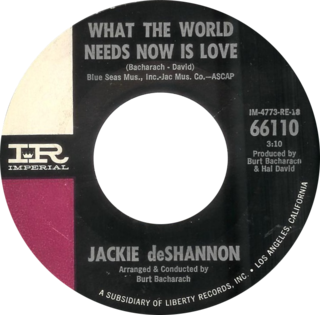
"What the World Needs Now Is Love" is a 1965 popular song with lyrics by Hal David and music composed by Burt Bacharach. First recorded and made popular by Jackie DeShannon, it was released on April 15, 1965, on the Imperial label after a release on sister label Liberty records the previous month was canceled. It peaked at number seven on the US Hot 100 in July of that year. In Canada, the song reached number one.

"Only Love Can Break a Heart" is a popular song from 1962, performed by the American singer-songwriter Gene Pitney. The song was written by Hal David (words) and Burt Bacharach (music) and appears on Pitney's second album Only Love Can Break a Heart.
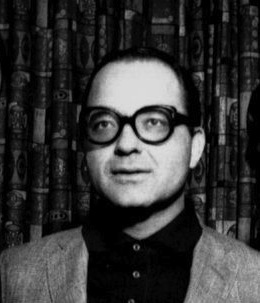
Aaron Harold Schroeder was an American songwriter and music publisher.
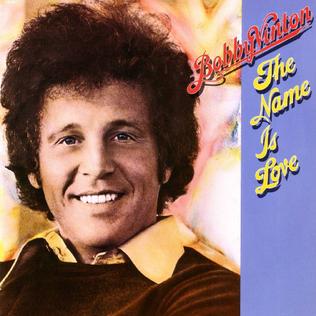
The Name Is Love is American singer Bobby Vinton's thirtieth studio album and his final for ABC Records. Unlike most of his albums, the majority of the material on this album was written or co-written by Vinton himself. Cover versions include "Hold Me, Thrill Me, Kiss Me" and "Only Love Can Break a Heart". The song "You Are Love" did not become a hit until six years later.

James Radcliffe was an American soul singer, composer, arranger, conductor and record producer.

A-tom-ic Jones is the second Tom Jones album for Decca, and third overall, released in 1966. The title is a pun. Les Reed was credited as the musical director.

Gene Pitney Sings Just for You is American singer Gene Pitney's third album, released on the Musicor label in 1963. It included the single "Mecca" which reached #12 on the U.S. Hot 100 and was a top 10 hit in Australia and Canada.
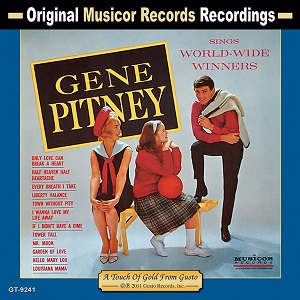
Gene Pitney Sings World Wide Winners is American singer Gene Pitney's fourth album, released on the Musicor label in 1963. The album mainly comprised material released on Pitney's first two albums, plus two non-album single tracks: "Louisiana Mama" and "Mr. Moon, Mr. Cupid & I", and one previously unreleased track: "Garden of Love".

Blue Gene is American singer Gene Pitney's fifth album, released on the Musicor label in 1964. The album contained the Burt Bacharach and Hal David hit "Twenty Four Hours from Tulsa", a top 10 hit in the United Kingdom, Canada and Australia and a top 20 hit on the US Billboard Hot 100 (#17), as well as the minor hit "Yesterday's Hero" (#64).

Gene Pitney's Big Sixteen is American singer Gene Pitney's seventh album, released on the Musicor label in 1964. The album contains a mix of hit singles and album cuts from Pitney's early records.
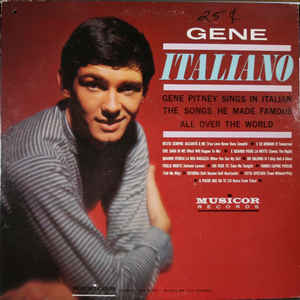
Gene Italiano is American singer Gene Pitney's eighth album, and first foreign language album, released on the Musicor label in 1964. The album features a number of Pitney's biggest early hits recorded in Italian, including "Twenty Four Hours From Tulsa", "Town Without Pity" and "Only Love Can Break a Heart".
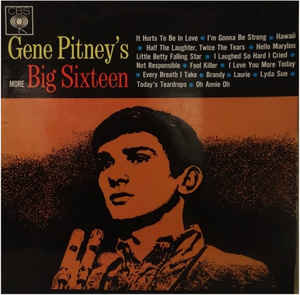
Gene Pitney's Big Sixteen, Volume Two is American singer Gene Pitney's tenth album, released on the Musicor label in the United States in 1965. The album was released as Gene Pitney's More Big Sixteen on the Stateside label in the United Kingdom.

I Must Be Seeing Things the 12th album released by American singer Gene Pitney, released on the Musicor label in the United States in 1965. The album was released as Looking Thru the Eyes of Love on the Stateside label in the United Kingdom.
"Trains and Boats and Planes" is a song written by composer Burt Bacharach and lyricist Hal David. Hit versions were recorded by Bacharach in 1965, by Billy J. Kramer and the Dakotas in the same year, and by Dionne Warwick in 1966.
The Furys were an American doo-wop group of the 1960s featuring tenors Tony Allen and Jimmy Green with baritone Jerome Evans. They were best known for a cover of "Zing! Went the Strings of My Heart, produced by James McEachin, and their performance of Gene Pitney's “If I Didn't Have a Dime".
"(The Man Who Shot) Liberty Valance" is a song written by Burt Bacharach and Hal David, which was released by Gene Pitney in 1962. It spent 13 weeks on the Billboard Hot 100 chart, peaking at No. 4, while reaching No. 2 on Canada's CHUM Hit Parade, and No. 4 on New Zealand's "Lever Hit Parade".
















